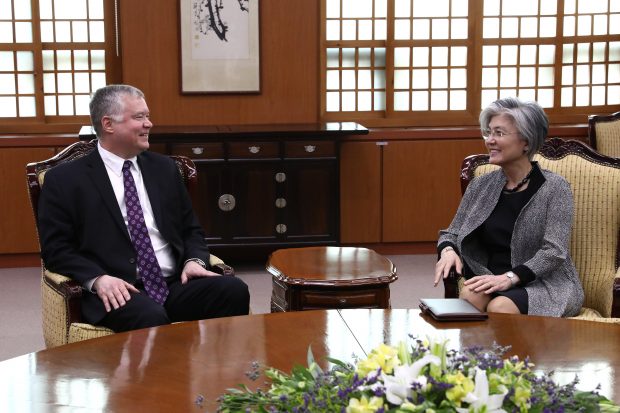Biegun discusses N.K. missile launches, food aid at ‘working group’ talks with S. Korea
U.S. Special Representative for North Korea Stephen Biegun held a series of meetings with South Korean officials in Seoul on Friday, a day after the North launched two missiles, the second such military move in less than a week. Biegun and his counterpart, Lee Do-hoon, presided over a meeting of the joint “working group” aimed at coordinating the allies’ approaches on the North’s denuclearization, humanitarian aid, sanctions enforcement and inter-Korean relations.
Less than a week after firing off multiple projectiles, the North launched the short-range missiles on Thursday, putting a damper on Seoul’s moves to provide food aid to Pyongyang as a potential catalyst for the resumption of nuclear negotiations between the U.S. and the North. The negotiations between Washington and Pyongyang have hit an impasse since the second summit between U.S. President Donald Trump and North Korean leader Kim Jong-un collapsed due to a failure to bridge gaps on the extent of Pyongyang’s denuclearization and Washington’s sanctions relief. Before the working group session, Biegun paid a courtesy call on Foreign Minister Kang Kyung-wha. “Nice to be back,” Biegun with a smile said as he was greeted by Kang.
The smile belied the undercurrents of tensions caused by the North’s missile launches the previous day. In an apparent sign of the U.S.’ caution in its public messaging, the plan to allow the press to cover Biegun’s opening remarks during the courtesy call was canceled. He also called off a brief press availability that he had planned to hold following the working group session, a diplomatic source here said. Aside from the foreign ministry staff, Seoul officials from the defense and unification ministries and the presidential office Cheong Wa Dae attended the working group meeting.
The U.S. side included Alex Wong, U.S. deputy assistant secretary of state for North Korea, and Allison Hooker, director for Korea on the White House National Security Council. The North’s escalatory military moves apparently topped the working group agenda as both South Korean President Moon Jae-in and Trump have expressed concerns over them. During a KBS interview on Thursday, Moon warned that Pyongyang’s such moves would make the negotiation phase harder. Trump said the U.S. is monitoring the North “very seriously” after its launch of the projectiles, adding he doesn’t think the regime is ready to negotiate. The working group meeting had been expected to focus on humanitarian aid as Seoul has pushed for it to persuade Pyongyang to return to dialogue at a time of spring poverty in the North hit by severe food shortages.
According to the U.N. Food and Agriculture Organization and the World Food Program, the North produced 4.9 million tons of crops last year, the lowest amount in a decade, and needs 1.36 million tons of food aid from outside. It remains to be seen if the allies can move forward their discussions on food aid amid lingering criticism about such assistance in the wake of its military moves While saying that the U.S. support for food aid came before Thursday’s launches, Moon noted the need for public understanding and consensus, and discussions among the ruling and opposition parties before the aid materializes. Later in the day, Biegun plans to meet Unification Minister Kim Yeon-chul. He is also expected to meet Chung Eui-yong, head of the presidential National Security Office, or its deputy chief Kim Hyun-chong. Biegun is set to leave Seoul on Saturday following a four-day visit.
























































